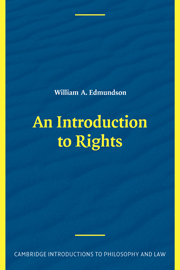Book contents
- Frontmatter
- Contents
- List of Tables
- Preface
- Part One The First Expansionary Era
- 1 The Prehistory of Rights
- 2 The Rights of Man: The Enlightenment
- 3 “Mischievous Nonsense”?
- 4 The Nineteenth Century: Consolidation and Retrenchment
- 5 The Conceptual Neighborhood of Rights: Wesley Newcomb Hohfeld
- Part Two The Second Expansionary Era
- Bibliographical Notes
- References
- Index
1 - The Prehistory of Rights
Published online by Cambridge University Press: 08 January 2010
- Frontmatter
- Contents
- List of Tables
- Preface
- Part One The First Expansionary Era
- 1 The Prehistory of Rights
- 2 The Rights of Man: The Enlightenment
- 3 “Mischievous Nonsense”?
- 4 The Nineteenth Century: Consolidation and Retrenchment
- 5 The Conceptual Neighborhood of Rights: Wesley Newcomb Hohfeld
- Part Two The Second Expansionary Era
- Bibliographical Notes
- References
- Index
Summary
Rights are universal, many people say. Everybody possesses certain fundamental rights simply by virtue of being human. But there are also many people who say that rights are a modern, Western invention. Rights are something made up, “constructed,” by a certain historical culture – call it the modern, bourgeois West – that seeks, for its own purposes, to export its notions and even to impose them upon other cultures regardless of their traditional ways. And some people seem to want to say both that rights are something that modern Western culture made up and that rights belong to everybody simply by virtue of being human – ignoring the apparent inconsistency.
One way of trying to reconcile these conflicting opinions about the nature of rights is to trace the history of rights discourse, and see whether rights or something equivalent to rights are recognized in all human cultures at all times. If they are, then that would settle the question: rights, whatever else they are, are not simply a modern Western invention. If, on the other hand, rights are not universally recognized across cultures, then the discovery may make us uneasy, for we will then have to face the following dilemma: Should we say that the particular moral cultures that do not, or did not, recognize rights are to that extent morally defective cultures, or should we say instead that the fact that a given culture rejects or ignores the idea of rights does not entitle us to draw any conclusions about its moral worth?
Information
- Type
- Chapter
- Information
- An Introduction to Rights , pp. 3 - 14Publisher: Cambridge University PressPrint publication year: 2004
